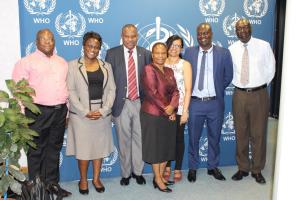Botswana conducts a comprehensive Malaria Performance Programme Review: Towards Elimination
Gaborone, Botswana - 9th to 20th October, 2017: The Ministry of Health and Wellness in Botswana World Health Organization and partners concludes a successful Malaria Programme Review
Globally, Botswana is among 21 countries with the potential to interrupt indigenous malaria transmission by 2020 thereby achieving the goal of malaria elimination. The country has made great progress in reducing the incidence of malaria from 42.52/1000 population in the year 2000 to 0.15 in 2012 with slight increase due to epidemics to 0.33 in 2016. The just ended programme performance review process of the National Malaria Strategic (2014-2018), the reviewers concluded that the country is on track to elimination, but a lot more effort still required to shift the whole Ministry and non-health sectors mind-set to regard elimination as unusual business.
The objectives of the review process were to assess: the progress of the national malaria programme towards the epidemiological and entomological impact targets; level of financing of the programme; capacity of the national malaria programme to implement planned activities; attainment of programme outcomes and define the programming implications of the lessons learnt in the implementation of the strategic plan as well as make recommendations for enhanced impact. The process involved an internal desk review and external validation.
Malaria elimination is high on the national health agenda as demonstrated by political commitment at the highest level and the availability of domestic financing in addition to technical and financial support from partners including the World Health Organization (WHO).
Malaria elimination is high on the national health agenda as demonstrated by political commitment at the highest level and the availability of domestic financing in addition to technical and financial support from partners including the World Health Organization (WHO).
For enhancing impact key major focus areas were recommended. Firstly, heightened advocacy to ensure elimination becomes a political economy issue through engagement of high level political leadership across all Ministries/sectors. Strengthening coordination and intersectoral collaboration in malaria elimination to make certain ascertain deeper understanding of malaria elimination among non-health sectors and communities. Provision of additional capacities in the programme with the right skills and expertise is required to raise the profile of the programme in addition to building institutional and technical capacity for the Programme and other stakeholders to deliver quality malaria elimination interventions. Development of new stratification to guide the development of the next Strategic Plan and targeting of malaria interventions is among top priorities including making the surveillance system more responsive in detecting malaria outbreaks and respond timely. This involves capacity building of health workers, availing guiding documents as well as strengthening of other systems like supply chain management for optimal delivery of malaria elimination services.
The findings of the review were shared with the Senior Ministry Management in the Ministry of Health and Wellness, Divisions and Departments within the Ministry and wider stakeholders for endorsement. The Permanent Secretary in the Ministry of Health and Wellness, Ms El- Shenaaz Halabi thanked the review teams for the good work done and coming up with very sound recommendations. She urged the national Malaria programme to use these critical recommendations in revising the current strategic plan. She urged WHO to continue to provide the required technical support to ensure Botswana achieves the goal of malaria elimination. The WHO Country Representative appreciated the work done by the review teams and reiterated that WHO will continue to work with all stakeholder to support the country to achieve malaria elimination by 2020.
The review process was conducted by an internal team made up of programme staff, health workers, academia and other stakeholders. The external review team comprised of Dr Ebenezer Baba (WHO/AFRO), Dr Elizabeth Juma (WHO/ IST/ESA), Dr Gawrie Loku Galappaththy ( WHO/GMP), Mr Anderson Chinorumba (WHO/ IST/ESA), Mr Jasper Pasipamire( WHO Zimbabwe) and Dr Kevin Makadzange (WHO Swaziland) with support from Ms Kentse Moakofhi (WCO Botswana). The World Health Organization provided technical and financial support towards the review process.

